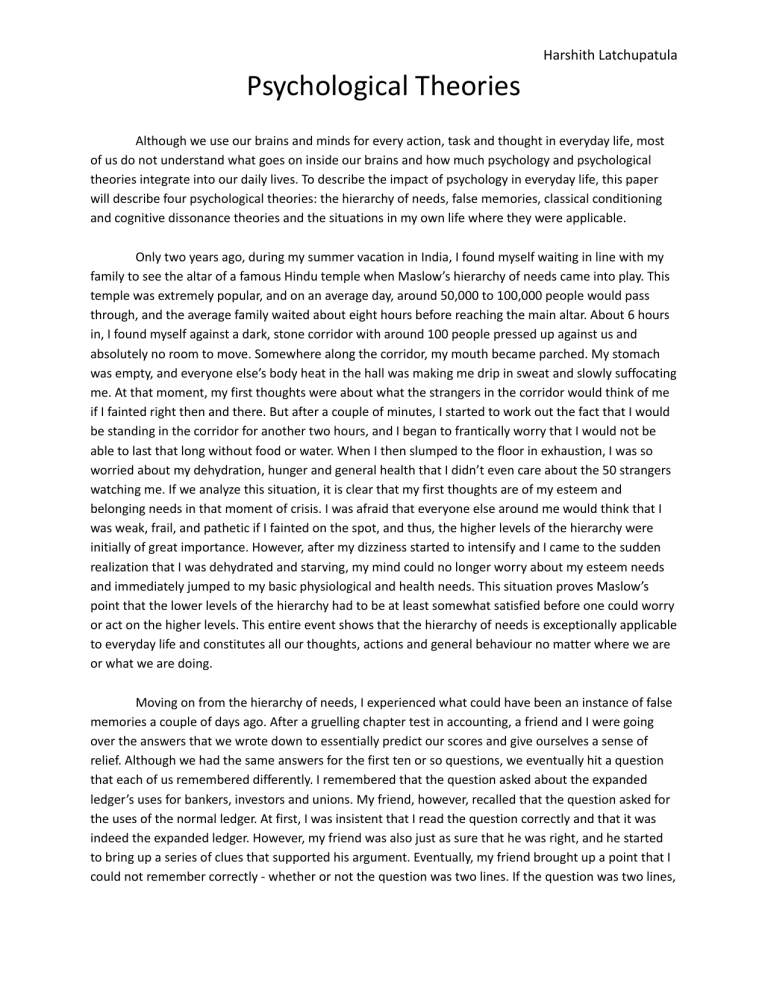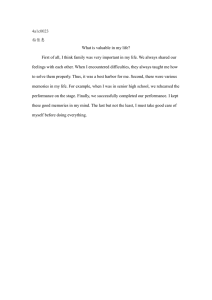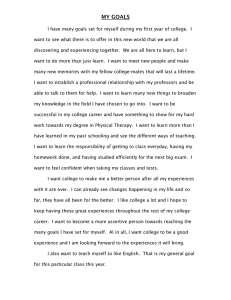
Harshith Latchupatula Psychological Theories Although we use our brains and minds for every action, task and thought in everyday life, most of us do not understand what goes on inside our brains and how much psychology and psychological theories integrate into our daily lives. To describe the impact of psychology in everyday life, this paper will describe four psychological theories: the hierarchy of needs, false memories, classical conditioning and cognitive dissonance theories and the situations in my own life where they were applicable. Only two years ago, during my summer vacation in India, I found myself waiting in line with my family to see the altar of a famous Hindu temple when Maslow’s hierarchy of needs came into play. This temple was extremely popular, and on an average day, around 50,000 to 100,000 people would pass through, and the average family waited about eight hours before reaching the main altar. About 6 hours in, I found myself against a dark, stone corridor with around 100 people pressed up against us and absolutely no room to move. Somewhere along the corridor, my mouth became parched. My stomach was empty, and everyone else’s body heat in the hall was making me drip in sweat and slowly suffocating me. At that moment, my first thoughts were about what the strangers in the corridor would think of me if I fainted right then and there. But after a couple of minutes, I started to work out the fact that I would be standing in the corridor for another two hours, and I began to frantically worry that I would not be able to last that long without food or water. When I then slumped to the floor in exhaustion, I was so worried about my dehydration, hunger and general health that I didn’t even care about the 50 strangers watching me. If we analyze this situation, it is clear that my first thoughts are of my esteem and belonging needs in that moment of crisis. I was afraid that everyone else around me would think that I was weak, frail, and pathetic if I fainted on the spot, and thus, the higher levels of the hierarchy were initially of great importance. However, after my dizziness started to intensify and I came to the sudden realization that I was dehydrated and starving, my mind could no longer worry about my esteem needs and immediately jumped to my basic physiological and health needs. This situation proves Maslow’s point that the lower levels of the hierarchy had to be at least somewhat satisfied before one could worry or act on the higher levels. This entire event shows that the hierarchy of needs is exceptionally applicable to everyday life and constitutes all our thoughts, actions and general behaviour no matter where we are or what we are doing. Moving on from the hierarchy of needs, I experienced what could have been an instance of false memories a couple of days ago. After a gruelling chapter test in accounting, a friend and I were going over the answers that we wrote down to essentially predict our scores and give ourselves a sense of relief. Although we had the same answers for the first ten or so questions, we eventually hit a question that each of us remembered differently. I remembered that the question asked about the expanded ledger’s uses for bankers, investors and unions. My friend, however, recalled that the question asked for the uses of the normal ledger. At first, I was insistent that I read the question correctly and that it was indeed the expanded ledger. However, my friend was also just as sure that he was right, and he started to bring up a series of clues that supported his argument. Eventually, my friend brought up a point that I could not remember correctly - whether or not the question was two lines. If the question was two lines, then it must have been the expanded ledger, but I just could not remember how many lines the question was. Slowly, after an enormous amount of insisting from my friend, I started to visualize the question with only one line, and for some reason, it began to feel accurate. I started worrying that perhaps my friend was correct and that the question had asked for the normal ledger. However, once we got our tests back, I looked at that question and saw that it mentioned the expanded ledger and remembered the question correctly. Somehow, while discussing the question with my friend, I falsely remembered and visualized the question differently in the form of false memory. A false memory is any alteration or misinformation that warps what happened through a strong suggestion from a question or another person. In this case, I was initially sure that it was the expanded ledger that the question referred to. However, after my friend insisted and provided more support to his argument, my memory started to change. I visualized the question from the details he provided and slowly began to feel that he was right, even though my initial memory was solid. Therefore, it is clear that false memories exist in many instances of daily life. One can only imagine just how difficult it can be to discern them among all the biased and inaccurate information fed to us. My third experience of psychological theories in my daily life relates to the concept of cognitive dissonance and rationalization. During the winter holidays, a couple of friends and I decided to change our habits and work ethics. We were all succeeding in school but were often procrastinating when we worked or some other productive activity. So, we set off to find some tutorials and resources to help us stop procrastinating when we stumbled upon some motivational videos on Youtube. At first, they were simply inspiring. But something interesting happened after we consistently listened for a couple of days: our real-life actions started to embody these motivational speakers’ advice. We began to stray away from doing meaningless things like watching television shows, waking up earlier, creating an exercise routine that we would follow each day and ultimately, wasting less time. For the first week or so, it was clear that this was working. But into the second week of the winter break, I started to see myself losing motivation and slacking off, and I felt quite regretful that I did not live up to my expectations. I then became extremely uncomfortable with the sensation of regret and shame. I began to explain to myself that I had done well during the previous week and that this made up for my lack of motivation to improve my habits. Looking back, it is now clear that this was cognitive dissonance at play. First, I performed an act that went against my core beliefs, which was essentially procrastinating when I should have been working. Then, I started to feel uncomfortable when I realized that I had gone against my core beliefs. Instead of merely accepting this and creating measures to ensure that this would not happen again, I began to tell myself that it was okay. I reduced the importance of the conflicting belief and told myself that my efforts during the previous week before made up for the mistake. Thus, it is clear that this example illustrates how cognitive dissonance can help convince a person that any wrong action is justified and allows people to lie to themselves in the face of discomfort. Finally, in addition to cognitive dissonance, I recently also recognized an example of fear conditioning - which derives from classical conditioning - that had inadvertently been created in my own life without me even noticing. See, when I was younger, like many children, I would do things behind my parents’ backs. Most days, my eyes would be glued to the television screen when I would hear the groaning of the front door opening. Immediately, I would feel a flush of adrenaline, fear and anxiety and would race to turn off the television and pretend like I was doing something else. However, what’s interesting is that this sudden flash of adrenaline that occurred when the door opened continues to occur even when I’m doing nothing wrong. Around five days ago, my parents went grocery shopping, and I was at home quietly working on a school project on my laptop. For about 40 minutes or so, I was extremely focused, and when my parents returned, I heard the door opening, and for some reason, my heart started to race as if I was doing something wrong and could have been caught. I felt fear as I heard the creaking sound of the door and the sounds of people stepping into the house. If we analyze the situation, it is clear that in my younger years, before any conditioning, my parents catching me doing something wrong (unconditioned stimulus) would have triggered the adrenaline and anxiety response (unconditioned response). Back then, the sound of the door opening (neutral stimulus) would not have resulted in any fear or any unconditioned responses. Only after I started to use the sound of the door opening as an indication that my parents had arrived did the conditioning start. After many instances where I experienced this fear of being caught and heard the door opening’s sound, I now unconsciously associate the sound of the door opening (conditioned stimulus) with my parents seeing me doing something wrong, which results in fear and anxiety (conditioned response). Thus, the entire situation shows how classical conditioning can impact our habits without us even recognizing it. To conclude, after recognizing and observing so many examples of psychological theories in my life, it’s apparent that psychology plays a massive role in ordinary life. Whether it is our desires based on the hierarchy of needs or our memories that can be changed by insistence on the part of others through false memories, what is clear is that recognizing and responding to these psychological mechanisms is more important now than ever. So the next time you argue with someone else or rationalize a mistake, remember that it’s likely that a psychological theory is at work.


